
Are Link Exchanges a Legitimate SEO Strategy in 2025?
What exactly is a link exchange?
Link Exchanges, Reciprocal Linking, Swapping Backlinks - You've probably heard the term in some shape or form. It's all the same thing.
Whether Google likes it or not, there are thousands of webmasters out there looking to give and receive a link exchange from fellow bloggers and website owners.

The perceived purpose or benefit of link exchanges is to gain an advantage on Google, using the logic that receiving a quality backlink will give you a 'trust' signal that may give you an advantage over the competition.
Being at the forefront of link building & outreach at LinkBuilder.io, we've come across literally hundreds of instances where webmasters have openly asked us to exchange links, and trust me, it's not only smaller bloggers who are actively practicing this.
We have personally seen websites with millions of visitors per month happy to exchange content-based links.
Is Exchanging Links a Legitimate Strategy?
Most traditional SEO's (especially those who aren't deeply involved in the link building space) would strongly advise against any kind of link exchanges.
It's true, exchanging and swapping links is an extremely divisive topic in the SEO and link building community, and most experts prefer to use other strategies. But as I've seen first hand, the landscape is changing and those involved in SEO even at the highest level will look to gain advantages where they can.
The truth is, this technique can help you land some super high authority backlinks.
Private Influencer Networks
A year or two ago, Glenn Allsopp aka Viperchill published this incredibly popular article on private link building. It talks about the concept of a 'private influencer network' and highlights some of his findings on huge companies like Cosmopolitan and Marie Claire using link exchange practices.
Glenn then uses an awesome graphic to show how some MAJOR tech publications on the internet all rose up together and regularly helped each other by passing backlinks to one another;
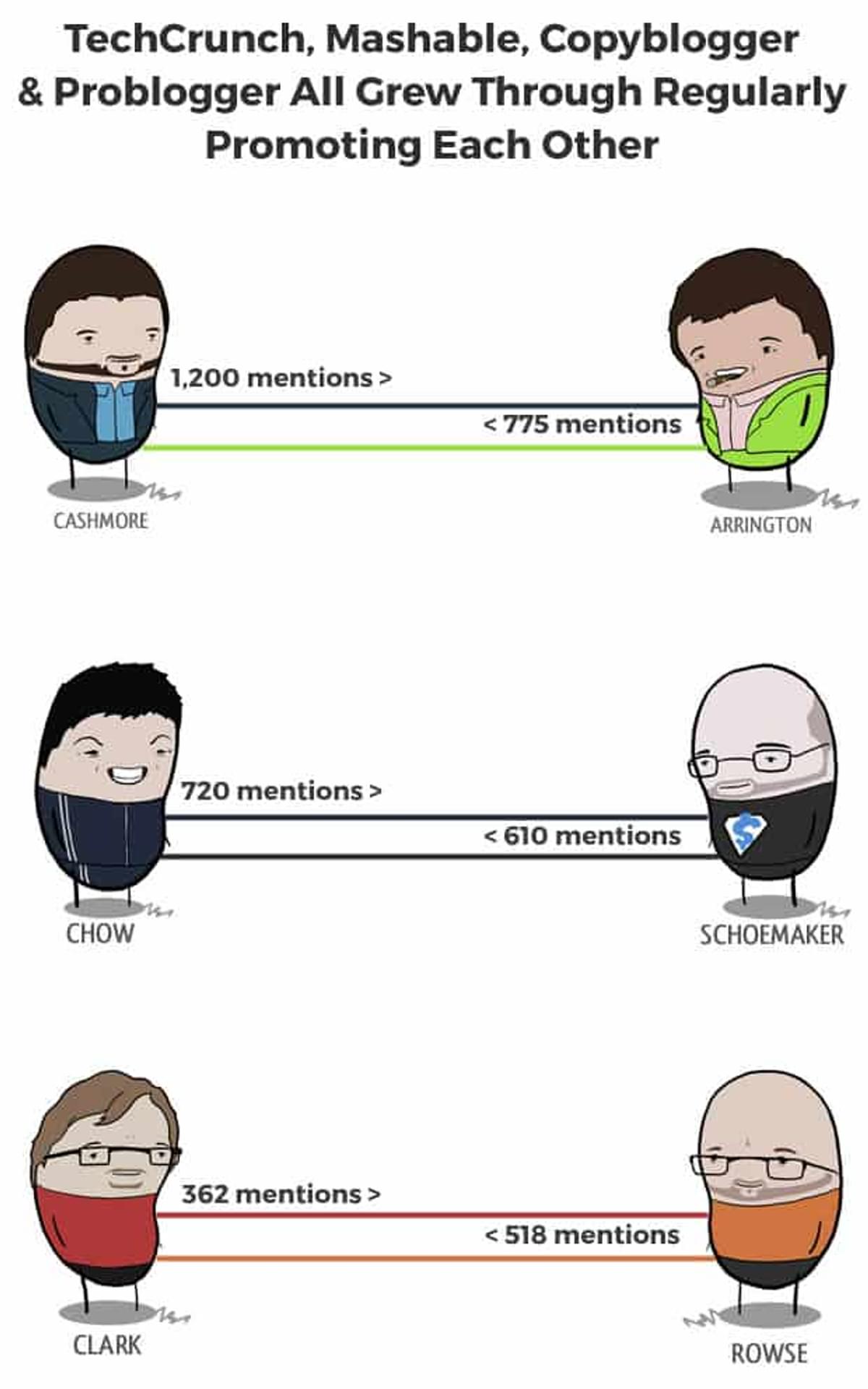
He goes onto to use some examples closer to home, and in particular, one major affiliate he found that was involved in a private influencer network with other major competitors in his space. They linked to each other's websites in order to bolster rankings.
Here's the diagram Glenn made (hopefully you don't mind me using these Glenn!);
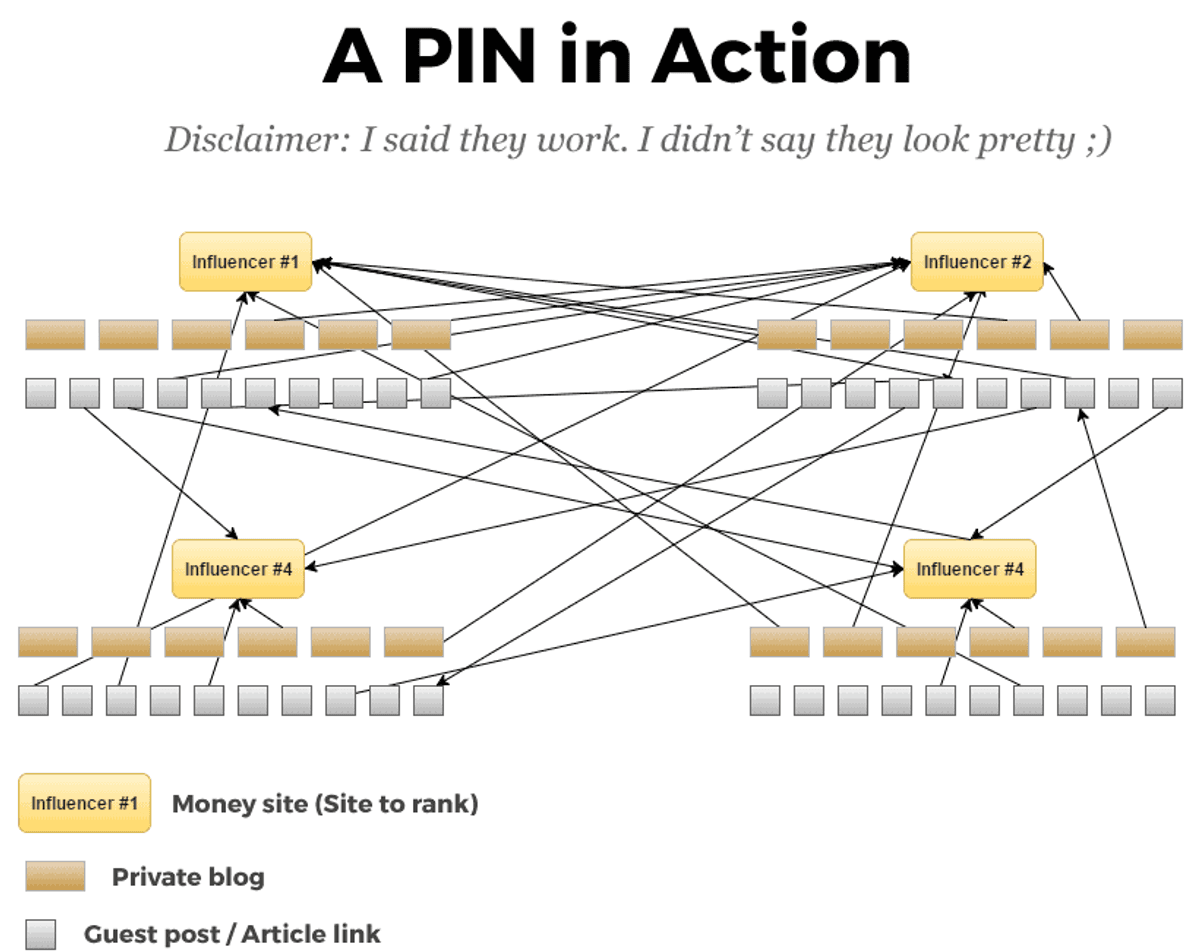
So as you can see, there would be a group of websites all linking indirectly to each other, with the ultimate goal of growing together.
This is certainly a pretty advanced method of swapping links, but certainly, food for thought and I personally found Glenn's insight pretty groundbreaking at the time. From my own personal experiences in link building and talking to content publishers in every niche imaginable, I can say with 100% certainty that even huge companies are practicing some similar strategies, but most often in a lower-key way.
What does Google Say on the Subject?
Google's Webmaster Guidelines clearly state that excessive link exchanges are against their terms. However, it's interesting to hone in on the language that Google use...
"Excessive link exchanges ("Link to me and I'll link to you") or partner pages exclusively for the sake of cross-linking"
The word 'Excessive' suggests that even Google understand and appreciate that it's very natural for websites to link to each other in certain situations - If I had a close friend in the internet marketing space, we'd probably link to each other. If I was running an event with a website, I'd probably link to my exhibitors and I'd expect they'd probably link to me as well. So there's a whole host of common scenarios where link exchanges are completely normal.
But Can I Get Penalized?
Of course you can and please do not take this article as an advocation of exchanging links, my intention is just to lay out the facts. I have still to this date, never heard of any website being penalized for exchanging links.
The likelihood is small, for reasons which we will soon explore. That said, there’s a first for everything, and Google has a history of making examples of people.
The Cold Hard Facts
Unless you're exchanging links in public or openly courting hundreds of websites for link exchanges, Google can't tell the difference between a manufactured link exchange and a natural link exchange. After all, Google is a machine-based algorithm.
Reciprocal Linking is Very Common
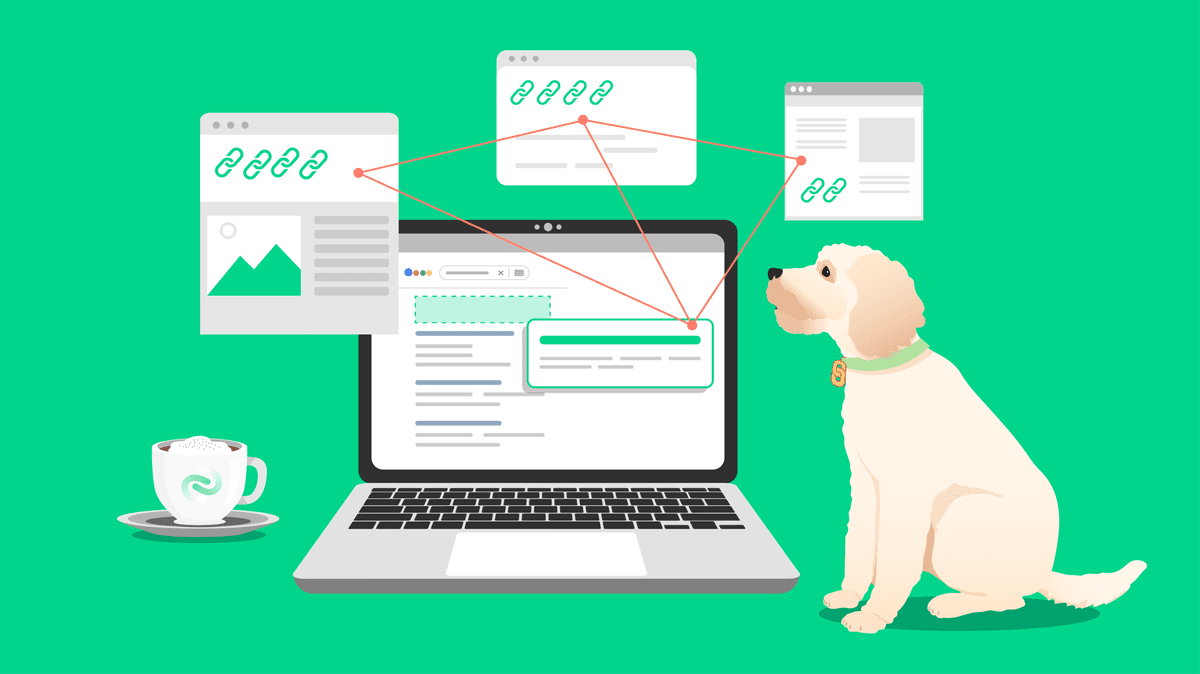
Ahrefs ran a beautiful study on reciprocal linking (another term for link exchanges) which gives some incredible factual information. I'm going to relay some cool facts from their investigation.
The study looked at 140,000 random domains with at least 10k organic visits/month - So essentially websites that perform pretty well and that Google likes (as opposed to old, outdated and unvisited websites)
However, please take this very important point of caution...
Joshua Hardwick touches upon this in the Ahrefs study. If indeed there were websites who Google penalized for exchanging links (which again, I've not heard of) then they would have been omitted from the Ahrefs study since the traffic would've been decimated and they wouldn't meet the study criteria.
The Numbers
- 74% of Sites Have Reciprocal Links
- 27% of websites had at least a 15% overlap between the sites which they link out to and the sites that link to them (So essentially, 15% of their inbound links are the equivalent to a link exchange)
- Ahrefs themselves found that 19% of the domains they link to also link back to them
When Should You Consider a Link Exchange?
It's very important to employ common sense when considering a link exchange. You shouldn't be too focused on any perceived SEO benefits or link juice. Instead, the focus should be on relevancy.
Ask yourself some basic questions: "Does this website have any content, tools or products that my visitors might actually find useful? Am I going to link to this person's page in a relevant way that's going to be helpful for my own users?"
And of course, think about the direct relevance of the website in question. Is the content quality good and related to your site?
For example, I own a successful Airsoft affiliate website, where 25% of our links come directly from other Airsoft websites. 60% come from other relevant spaces such as outdoors, adventures and hobbies, whilst only 15% of links come from other random sources.
Cheat sheet questionnaire to follow when considering a link exchange
- Does the website have a DR (domain rating) greater than 40?
- Does the website have over 5,000 organic visitors per month?
- Is the website’s audience relevant to mine?
- Is there a clear connection between the content we’re both proposing to link to on each others site?
Guest Post Swaps
One very common strategy nowadays that people are using is 'guest post swaps'.
This is where you have two people who are frequently contributing guest posts to a number of different websites.
The process is extremely simple:
- The other person will link to your website in a guest post that they're contributing
- You will link to that person's website in a guest post that you're contributing to another site
Essentially, you're just leveraging each other's guest post activities to help each other out.
Here's a simple diagram showing how it works...
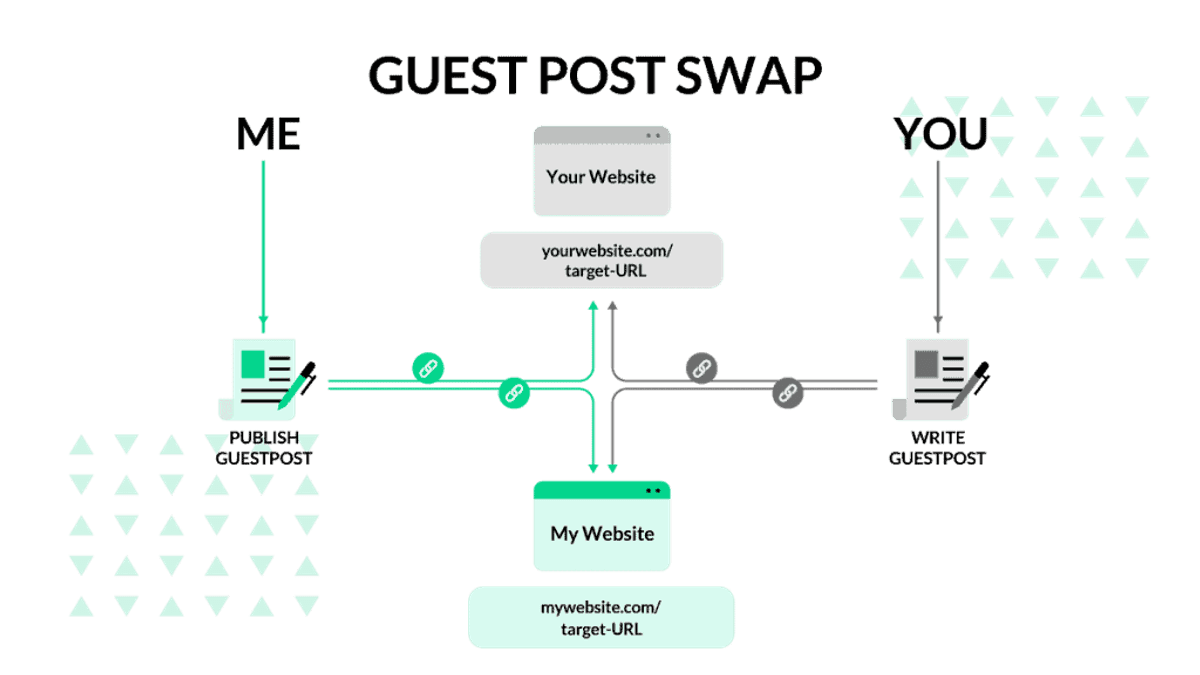
When to Avoid Link Exchanges Entirely
Of course, we want to use a qualitative analysis before we go any further. So again, question whether the website is relevant, useful and basically whether or not you like the website. Check out their social profiles, investigate the owner's LinkedIn and get a feel for the brand.
Once you've passed this stage, you do some metric checks;
Key Metric Checks
- Outbound links ratio: Does the website have an outbound links ratio of less than 2? For example, if the website has 100 inbound links, you don’t want them having too much more than 200 outbound links. You’ll find that link-farm sites, PBNs and the like have dangerous outbound links ratios and should be avoided.
- Site age: Generally speaking, you’ll only want to exchange with well-established sites that are at least a couple of years old. They’re more robust and if someone has set up a site and still cares about it after 2 years, that’s far better than a new website owner who isn’t yet sure of his or her project.
- Majestic Trust Flow: If you have Majestic, check if the Trust Flow (TF) is greater than 10.Trust Flow is a number predicting how trustworthy a page is based on how trustworthy sites tend to link to trustworthy neighbors.
How to Exchange Links in the Safest & Best Way Possible
I want to very clearly state that your strategy shouldn't be to go out there and look for people who want to explicitly exchange links. Rather, you should be generous to other people and other bloggers - Compliment people, link out freely whenever you come across relevant content that genuinely helps you out.
If you are going to exchange links, I recommend never directly linking from page A to page B and vice versa.
Instead, you should do it like this...
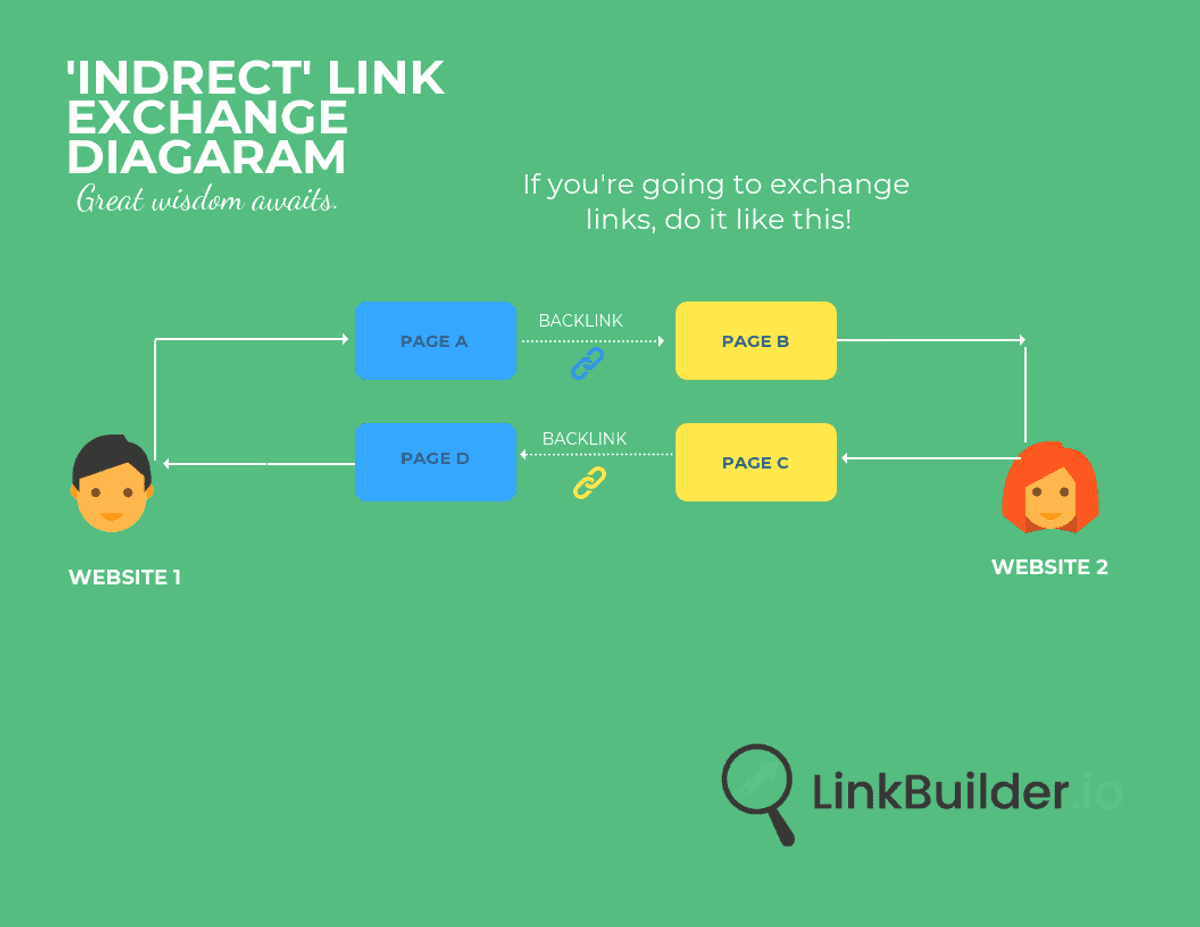
So with the setup as you can see, we have 4 pages involved, and there's no clear link footprint between any 2 pages.
Important Safety Tips For Swapping Links
- Don’t use this as your primary link building strategy! Incorporate a whole host of other strategies such as linkable content outreach and guest posting.
- Only exchange links with trustworthy people who you have an established relationship with.
- Make sure that your overall % of link exchanges is safe for your niche and in a normal range compared to your competitors – cross-check outgoing links with incoming links and find duplicates using a spreadsheet.
- As a rule of thumb, I’d recommend ensuring that you don’t have any more than 1 exchanged link for every 10 links from other natural sources
You definitely want to avoid any kind of site-wide link exchange. This was something that people practiced years ago and it was truly rampant in certain industries. I'm convinced that Google has measures in place to cancel out any ranking benefit from these types of links.
Leverage Slack & Facebook Groups
There's a growing popularity of private Facebook and Slack groups where link exchange opportunities present themselves.

One example is the 'B2B Bloggers Boost' group on Facebook.
The premise is very simple - Link out to other members of the group and they'll link to you in return. It's a self policed system, and any outside who demand links and giving nothing in return are kicked from the group. I like this system because it promotes sharing only high quality content and discourages low quality.
If you're creating incredible content on a consistent basis, either on your own website or through guest posts, then these groups are a fantastic opportunity.
Conclusion
My take on exchanging backlinks is one of common sense. Don't use it as a core link building strategy, but if you're a professional in a certain space, I'm sure you'll have friends and peers. It's inevitable that situations will arise when linking to one another becomes tempting and in many cases makes sense.
I'll revert back to the official language used in Google's guidelines - Excessive link exchanges won't be tolerated.
So like a fine whiskey, don't drink to excess. By all means, have a drink now and then, but don't get blackout drunk in a haze of reciprocal link building.

